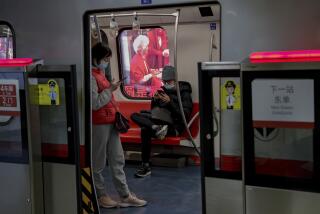The city of San Gabriel wants you to follow it on Weibo
The city of San Gabriel announced Thursday that it will use the popular micro-blogging service Weibo to reach constituents, reflecting a growing trend of governments turning to social media to connect with hard-to-engage Chinese immigrant communities.
The account, which has been active since May, has about 200 followers so far. Their first official post, replete with a clapping emoji, has gotten four re-blogs.
“Check out our microblogging account to get the latest news and information from City Hall!” the update reads in Chinese.
The Alhambra Police Department was the first U.S. agency to join Weibo in late 2013, and police departments in Arcadia, San Leandro and Waterloo, Canada, soon followed.
San Francisco Mayor Ed Lee and Alhambra Mayor Stephen Sham also have accounts with thousands of followers. And other agencies, including the California Highway Patrol, are experimenting with the service to tap a potentially huge Chinese immigrant audience in California.
The service, which works like a hybrid of Facebook and Twitter, has more than 400,000 users in the state, according to Danica Xu, a staffer at Weibo’s offices in Northern California.
Across the state, the growing use of Chinese social networks such as Weibo, Wechat and other Chinese-language Web services have mobilized unprecedented immigrant civic engagement.
Chinese social networks were instrumental in organizing protests to Senate Constitutional Amendment 5, which would have allowed voters to decide whether to restore affirmative action to California colleges and universities. The amendment was eventually shelved.
Government Weibo accounts are sometimes the only way to reach a Chinese immigrant population that struggles to navigate life in America, said Walter Yu, a part-time court interpreter who has helped launched Weibo accounts in Monterey Park, Alhambra and San Gabriel.
It’s not just a language barrier, he said. Chinese immigrants are also trying to understand democratic governments, which offer more participation than they may be accustomed to.
Disseminating information on Chinese social media helps present information not only in the right language but in a context that Chinese users can understand, Yu said.
In Alhambra, the result has been significant increase in engagement from the Chinese community. The police department saw a 60% increase in the number of service calls requiring Chinese translation after the Weibo account was launched.
Social media users in China have greeted American government Weibo users with fascination -- and follows.
Many American agencies and government officials have become minor Chinese social media celebrities. More than half of the Alhambra Police Department’s 40,000 followers are located overseas, Yu estimates.
The San Leandro Police Department has a whopping 218,000 Weibo followers, and a city population of about 89,000.
Weibo is hardly the only Chinese-language microblogging game in town.
Chinese users both abroad and in California have increasingly migrated to Wechat, a mobile-based social network that has around 600 million monthly users -- about three times that of Weibo.
Yu has has also partnered with multiple local agencies to try to tap Wechat users for crime tips and civic engagement, but it’s harder to build an audience on Wechat. Wechat posts are only seen by an account’s followers, while Weibo updates come with a web address that anyone with an Internet connection can navigate to, he said.
Nearly half of San Gabriel’s population is Chinese, and officials say the city’s new Weibo account is part of a larger effort to conduct city business in a language the residents understand. News conferences and news releases are increasingly using Mandarin as well as English.
Officials hope to use Weibo to get the word out about bulky item pickup policies, explain construction traffic delays and attract immigrants to city-sponsored events such as summer concerts and cultural festivals. Promoting Chinese tourism is also a major goal, with multiple hotels under construction in the city and an increasing reliance on tourism revenues, said San Gabriel Mayor Jason Pu.
“This is about reaching our Chinese population where they’re already spending time and in a language they’re most comfortable with,” Pu said.
More to Read
Sign up for Essential California
The most important California stories and recommendations in your inbox every morning.
You may occasionally receive promotional content from the Los Angeles Times.











